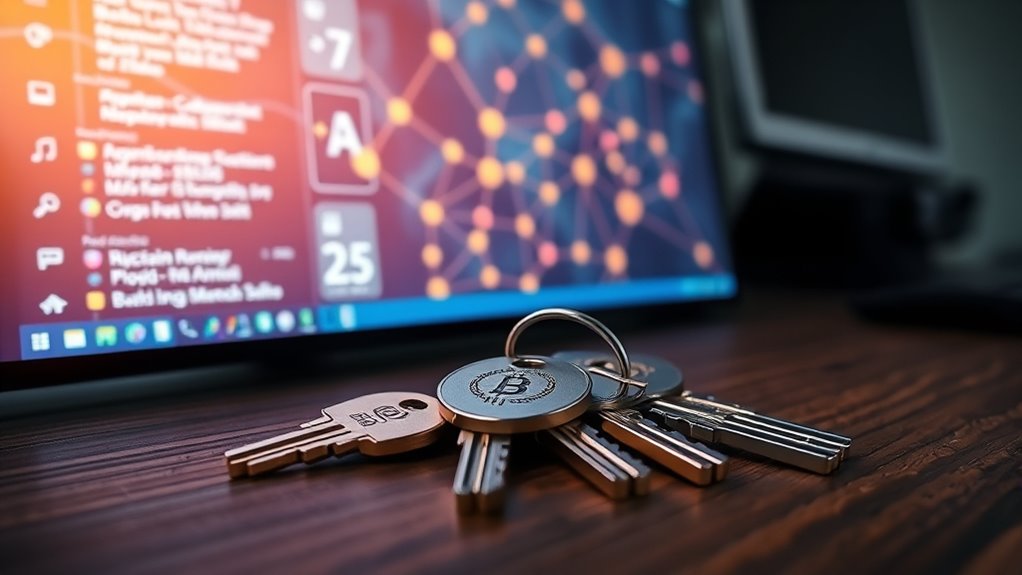Multi-signature wallets protect your funds by requiring multiple approvals before a transaction goes through, so no single person has control over your assets. This shared control means that even if one private key is compromised, your funds stay safe because additional signatures are needed. It reduces the risk of theft and unauthorized access, especially in shared or organizational accounts. To discover how this layered security can further safeguard your digital assets, keep exploring the options available.
Key Takeaways
- Multi-signature wallets require multiple approvals, reducing the risk of unauthorized transactions.
- Shared control prevents any single compromised key from moving funds unilaterally.
- Requiring multiple signatures increases security against hacking and theft attempts.
- It ensures transaction approval can proceed even if one key holder is unavailable.
- Distributing control among multiple parties fosters accountability and enhances fund protection.

Have you ever wondered how to enhance the security of your digital assets? As cryptocurrency adoption continues to grow, so does the importance of robust wallet security strategies. One effective method gaining popularity is using multi-signature wallets, which add an extra layer of protection by requiring multiple approvals before any transaction is processed. Instead of relying on a single private key, these wallets distribute control across several keys held by different parties or devices. This setup considerably reduces the risk of theft or unauthorized access because a single compromised key isn’t enough to move funds.
Multi-signature wallets are particularly valuable in environments where shared control is necessary, such as business accounts or joint holdings. They enable you to set a predetermined number of signatures needed to authorize transactions—say, two out of three keys—offering a safeguard that prevents any one individual from unilaterally draining funds. This shared control not only boosts security but also fosters accountability, as multiple parties must agree before funds are moved. It’s an important step in aligning with best practices for wallet security strategies, especially as more people embrace cryptocurrency for both personal and institutional use.
Implementing multi-signature wallets helps mitigate common vulnerabilities associated with traditional single-key wallets. If a private key gets compromised, the attacker still can’t access your funds without the additional signatures. This layered approach makes hacking considerably more difficult and discourages theft. furthermore, multi-signature setups can include hardware wallets or secure key management solutions, further enhancing security by isolating keys from online threats. Many platforms now support multi-signature configurations, making it easier for users to adopt this technology and integrate it into their overall security strategy.
In addition to security benefits, multi-signature wallets improve operational flexibility. For example, if one key holder is unavailable, transactions can still be approved by the remaining signers, ensuring business continuity. For organizations, this means fewer delays and more control over financial operations. As cryptocurrency adoption accelerates, understanding and implementing advanced wallet security strategies like multi-signature wallets becomes essential. They empower you to safeguard your assets effectively while facilitating shared control, making them an invaluable tool for both individual investors and organizations aiming to protect their digital holdings in a rapidly evolving landscape. Enhancing security through multi-signature wallets is a key aspect of modern digital asset management.
Frequently Asked Questions
Can Multi-Signature Wallets Be Hacked More Easily Than Single-Signature Ones?
No, multi-signature wallets aren’t more vulnerable to hacking than single-signature ones. While single signature vulnerabilities can be exploited easily if private keys are compromised, multi-signature setups require multiple approvals, making it harder for hackers to succeed. You benefit from shared control, which counters hacker tactics aimed at single points of failure, providing extra security and reducing the risk of a successful attack.
What Are the Main Risks Associated With Shared Control of Funds?
You face trust issues and key management risks with shared control of funds. If one signer becomes untrustworthy or their key is compromised, your funds could be at risk. Coordinating approvals may cause delays or disagreements, potentially leading to vulnerabilities. Proper key management, clear protocols, and monitoring help mitigate these risks, but you must remain vigilant to prevent unauthorized access or misuse in multi-signature setups.
How Do Multi-Signature Wallets Handle Lost or Compromised Keys?
When keys go missing or get compromised, multi-signature wallets act like a fortress with multiple gates. You’ll typically use key recovery options and strict security protocols to restore access or revoke compromised keys. This layered approach guarantees that losing one key doesn’t jeopardize your funds, maintaining security while allowing you to regain control swiftly. It’s a strategic safety net that keeps your assets protected against unforeseen breaches.
Are Multi-Signature Wallets Compatible With All Cryptocurrencies?
You’ll find that multi-signature wallets are not compatible with all cryptocurrencies, as their cryptocurrency compatibility depends on the blockchain integration. Some blockchains, like Bitcoin and Ethereum, support multi-sig features, while others may not. Before choosing a multi-signature wallet, confirm it integrates seamlessly with your preferred cryptocurrency’s blockchain. This compatibility ensures you can manage your funds securely across different platforms with shared control.
What Are the Costs Involved in Setting up a Multi-Signature Wallet?
Setting up a multi-signature wallet involves minimal setup costs, mainly related to choosing the right platform or software, which might be free or have a one-time fee. Maintenance expenses are typically low but can include transaction fees and potential upgrades. You should also consider security costs, like hardware wallets or additional backups. Overall, the costs are manageable, and investing in proper security measures helps protect your funds effectively.
Conclusion
With multi-signature wallets, you hold a key to shared security. While a single key can be lost or stolen, multiple signatures act like a fortress, each lock protecting your funds. Imagine your assets as a vault, guarded by several guards instead of just one. This shared control doesn’t just prevent theft; it creates a safety net, giving you confidence and peace of mind. In a world of threats, your funds stay protected, no matter what comes your way.









